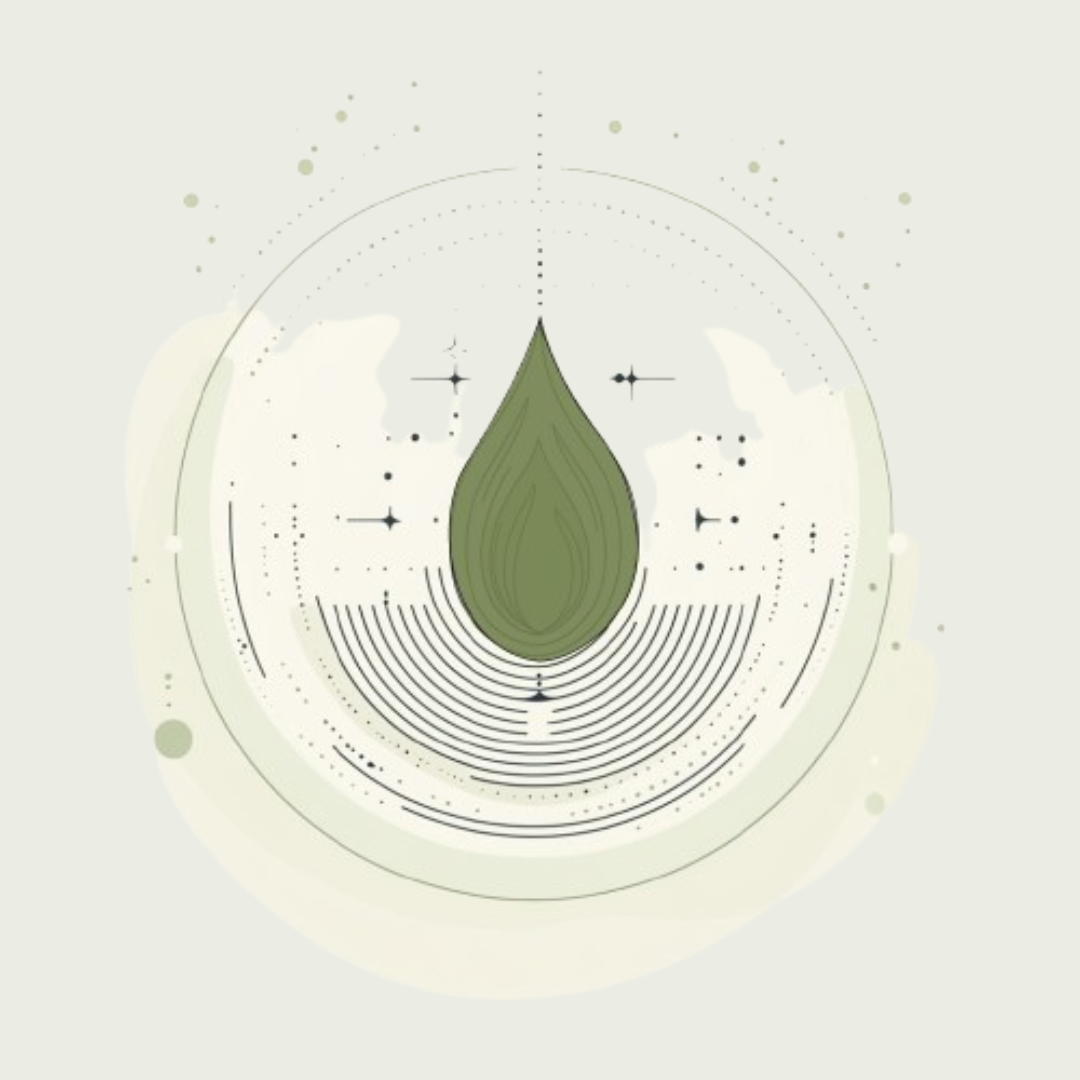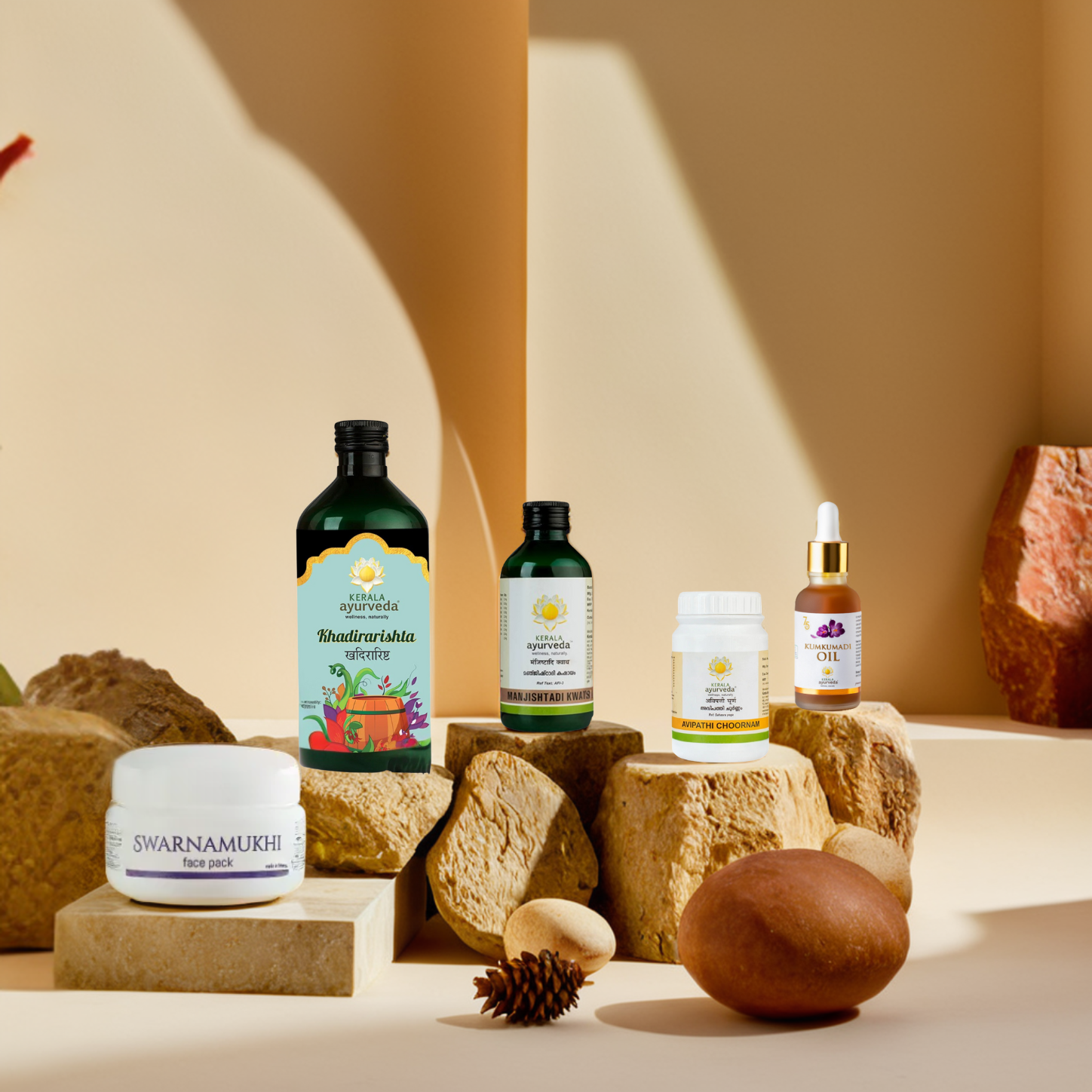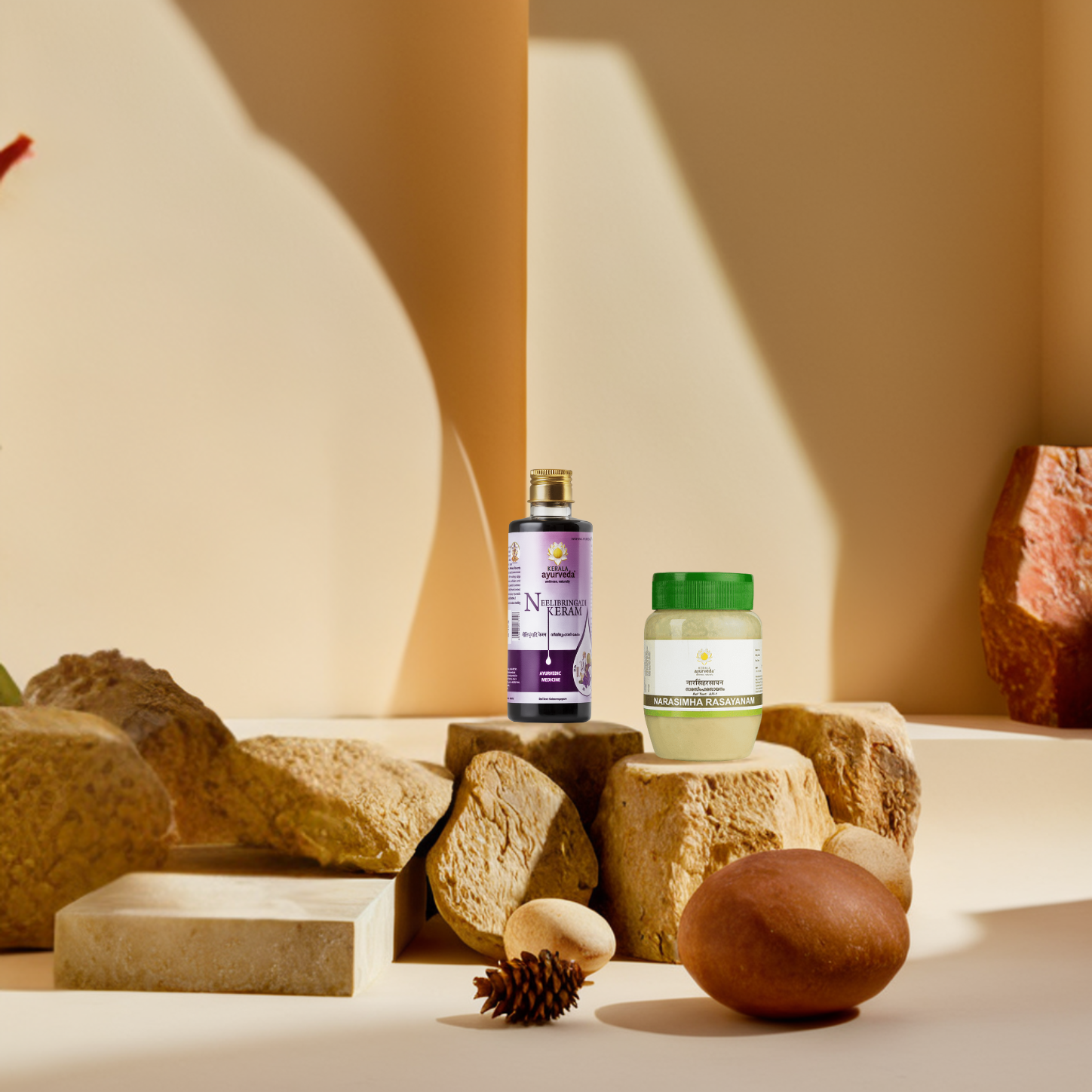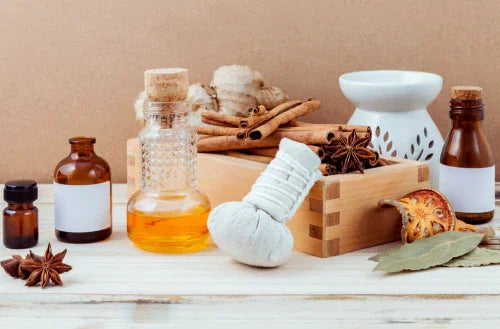Highlights
Do you feel overwhelmed, disconnected from yourself, or simply in need of rejuvenation?
You're not alone. 1 in 2 urban Indians (53%) have experienced stress so intense that it affected their daily lives over the past year. Modern routines often leave little room for self-care, leading to imbalances in physical, mental, and emotional well-being.
Ayurveda offers a simple yet effective solution: Abhyanga massage, a therapeutic self-massage with warm, herb-infused oils that nurture your body and calm your mind.
Regular Abhyanga massage can help by reducing stress, improving circulation, nourishing the skin, and bringing balance to your doshas("fault" or "defect"). This holistic practice combines physical relaxation with emotional grounding, making it a powerful addition to your self-care routine.
Are you ready to discover the benefits of Abhyanga and learn how to integrate this ancient ritual into your life? Let’s explore the techniques, oils, and steps that make this Ayurvedic tradition a path to wellness.
What is Abhyanga?
“Abhyanga is a therapeutic massage technique using warm oils infused with medicinal herbs.”
In Ayurvedic tradition, Abhyanga is considered an act of self-love, nurturing both the physical body and the inner self. It stimulates Marma points—energy centers that facilitate the flow of prana (life force)—encouraging vitality and emotional well-being.
But what makes this practice so deeply transformative? Let’s explore the profound benefits of Abhyanga and how it supports holistic health.
Benefits of Abhyanga
Abhyanga, the traditional Ayurvedic oil massage, brings a range of benefits that refresh both your body and mind. When you make it a part of your routine, you can enjoy noticeable improvements in several areas of your health:
Stress Reduction
The gentle, rhythmic strokes of Abhyanga massage work wonders in calming your nervous system. By reducing cortisol levels, it helps you feel relaxed, easing stress and anxiety. This practice brings a sense of tranquillity and mental clarity, leaving you more centered and peaceful.
Improved Circulation
Abhyanga massage enhances blood flow across your body, ensuring better oxygen and nutrient delivery to your cells. This improves your energy levels, speeds up recovery from tiredness, and keeps your vital organs functioning efficiently.
Skin Health
Applying warm herbal oils during Abhyanga massage deeply nourishes your skin, leaving it soft, glowing, and hydrated. It reduces dryness, smoothens wrinkles, and helps you achieve a naturally radiant look with regular use.
Lymphatic Detoxification
Abhyanga supports your body’s natural detox process by stimulating lymphatic flow. This helps flush out toxins, boosts your metabolism, and strengthens your immune system, making you feel lighter and healthier.
Dosha Balance
Ayurveda focuses on balancing the three doshas—Vata, Pitta, and Kapha—for good health. Abhyanga brings these energies into harmony, restoring balance in your body. This alignment boosts your vitality, sharpens your focus, and improves emotional stability.
Thus, adding Abhyanga massage to your daily or weekly self-care routine not only revitalises your physical health but also enhances your emotional and mental well-being, making it an essential practice for holistic wellness.
Now, let’s explore how Abhyanga benefits your physical and mental health in greater detail.
Physical and Mental Health Benefits
Abhyanga goes beyond relaxation, offering a host of physical and mental health benefits that enhance your overall well-being:
- Promotes Restful Sleep: The calming effect of warm oils and rhythmic massage relaxes your body and mind, making it easier to fall asleep and improving sleep quality.
- Relieves Pain and Stiffness: Abhyanga massage soothes sore muscles, reduces joint pain, and alleviates stiffness, providing comfort to those with chronic aches or sedentary lifestyles.
- Anti-Aging Properties: Regular Abhyanga nourishes tissues (dhatus), reducing wrinkles and promoting youthful, radiant skin while enhancing overall vitality.
- Enhances Immunity: By stimulating lymphatic flow and circulation, Abhyanga helps flush out toxins and strengthens your body’s natural defences against illnesses.
Curious about starting this rejuvenating practice? Follow our step-by-step guide to integrate Abhyanga into your routine effortlessly.
How to Practise Self-Abhyanga: Step-by-Step Guide
Follow these simple steps to incorporate the rejuvenating practice of Abhyanga into your routine:
Step 1: Warm the Oil
Gently heat your chosen oil to a comfortable temperature. Warm oil not only feels soothing but also improves absorption into the skin.
Step 2: Set the Ambience
Choose a calm, warm space for your massage. A quiet environment enhances relaxation and allows you to focus on the experience.
Step 3: Apply the Oil Systematically
- Use long, even strokes on your arms and legs.
- Massage joints in circular motions.
- Start from your feet and gradually work your way up to the scalp, ensuring full-body coverage.
Step 4: Allow Time for Absorption
Let the oil sit on your skin for 15–20 minutes. This allows your body to absorb its nutrients fully before rinsing with warm water or a gentle herbal cleanser. For a professional Abhyanga experience, book a session at Kerala Ayurveda today!
Choosing the right oil tailored to your needs can make your Abhyanga experience even more beneficial. Let’s explore how to select the perfect oil for your practice.
Choosing the Right Oil
The right oil is essential for maximising the benefits of Abhyanga massage, as it complements your unique dosha and addresses specific body needs. Here’s a guide to selecting the most suitable oil based on your Ayurvedic constitution:
For Vata Dosha
If you often feel cold, experience dry skin, or have a sensitive constitution, sesame oil is your best choice. Its grounding and warming properties soothe dryness, nourish the skin, and calm the nervous system, making it perfect for Vata types.
For Pitta Dosha
For those prone to heat, inflammation, or sensitive skin, coconut oil works wonders. Its cooling nature balances Pitta by calming irritation, reducing redness, and providing a refreshing sensation during the massage. Incorporating high-quality oils, such as Kerala Ayurveda’s Virgin Coconut Oil, can further enhance your Abhyanga practice with its soothing properties and traditional purity, making it an excellent choice for holistic skin care.
For Kapha Dosha
Kapha types often benefit from invigorating and warming oils. Mustard oil is an excellent option as it stimulates circulation, combats sluggishness, and energises the body, making it ideal for Kapha imbalances.
For a well-rounded approach to Abhyanga, consider a Bala Thailam. It is a powerful oil designed to strengthen muscles, joints, and bones. Enriched with herbs like Bala, Guduchi, and Rasna, it revitalizes overused joints and nourishes weak muscles, helping you stay active and strong.
Considerations and Precautions
While Abhyanga massage is safe for most, consider these precautions:
- Avoid massaging immediately after heavy meals or during discomforts like migraines.
- Consult a healthcare provider if you’re pregnant or have specific health concerns.
- Use oils sparingly if your skin is naturally oily or prone to breakouts.
Disclaimer: Precautions for Safe and Effective Abhyanga for Kapha Dosha
Before starting Abhyanga, consult a qualified practitioner if you have medical conditions or sensitivities. Perform a patch test to check for allergies, and use moderate amounts of oil to avoid feeling heavy. Refrain from massage during illness, inflammation, or fever. Warm the oil to a comfortable temperature and ensure a cozy environment for the practice. Allow the oil to absorb for 15–30 minutes before showering, and avoid harsh soaps. Personalize your approach to suit your needs for optimal benefits.
Conclusion
Can a simple self-massage practice truly transform your health and well-being? With Abhyanga massage, the answer is a resounding yes. This ancient Ayurvedic ritual offers a wealth of benefits, from reducing stress and improving circulation to promoting restful sleep and balancing your doshas. Choosing the right oils and incorporating this practice into your routine will not only nurture your body but also cultivate a deeper connection with your inner self.
At Kerala Ayurveda, we combine 80 years of Ayurvedic expertise with authentic, high-quality products to help you embrace holistic wellness. From oils like Bala Thailam for strengthening muscles and joints to tailored solutions for everyday wellness, our offerings are crafted with precision and care. Ready to experience the benefits of Abhyanga massage? Explore Kerala Ayurveda’s trusted range of oils and products today and take a step towards a healthier, more balanced life. Contact us now!
FAQs
1. How often should I practice Abhyanga massage?
For optimal benefits, it’s recommended to practice Abhyanga daily, ideally in the morning before a bath. If daily practice is not feasible, aim for at least 2–3 times a week.
2. Can Abhyanga help with hormonal imbalances?
Yes, Abhyanga stimulates the endocrine system by calming the nervous system and improving circulation. This can support hormonal balance, especially when combined with a dosha-specific approach.
3. What is the best time of day for Abhyanga?
Morning is the best time for Abhyanga as it helps energise the body and mind for the day. Evening massages are also beneficial for promoting relaxation and better sleep.
4. Can Abhyanga be practiced during pregnancy?
Abhyanga can be beneficial during pregnancy, but it’s essential to consult an Ayurvedic doctor for personalised guidance and to use oils suitable for your condition.
5. Is Abhyanga suitable for people with sensitive skin?
Yes, Abhyanga can be tailored for sensitive skin by using mild, cooling oils like coconut oil or specially formulated herbal oils designed to calm irritation and nourish the skin.





